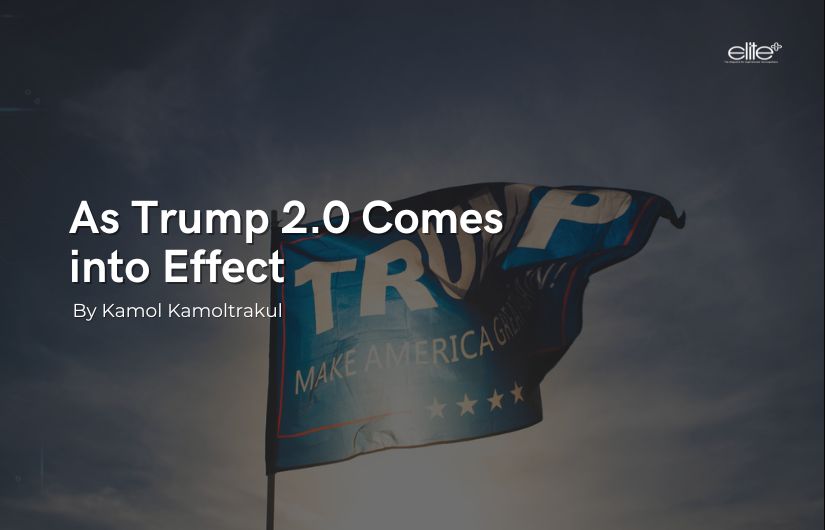by Kamol Kamoltrakul
According to some analysts, Trump is a man of action; he means what he says. Donald J Trump was sworn in as the 47th president of the United States on Monday, 20 January 2025 at noon sharp. He became the second person to be re-elected in a non-consecutive term after winning the national popular vote over Vice President Kamala Harris by more than two million votes. The inauguration was held in the US Capitol Rotunda with the Joint Congressional Committee on Inaugural Ceremonies responsible for planning and executing this, the 60th presidential inauguration.
All are now watching to see what mega-storms Donald Trump will bring upon the world after being sworn in. During the campaign, Trump declared that the Israel-Hamas war must end before he takes office or he will send them to hell. He says he did just that, taking credit for forcing Israel to sign a ceasefire and begin a hostage-prisoner exchange with Hamas on Sunday, 19 January, the day before his inauguration.
He has also pledged to end the war in Ukraine after he takes office and made a number of promises, including repealing Obamacare and starting deportations of undocumented migrants.
Trump pledged “American greatness” would return if he was re-elected. He has announced he will seize the Panama Canal and Greenland. During the campaign, Trump also emphasised his tough stance on China, viewing it as America’s main rival. He accused Beijing of “unfair trade”, “intellectual property theft” and irresponsibility regarding the Covid-19 pandemic. Trump has also said he will “bring jobs back to the United States”, support domestic manufacturers and reduce US economic dependence on China, focusing investment on building domestic manufacturing and production.
The world is watching for the “storm” as Trump begins his second term as president. In his inaugural speech, Trump repeated the issues and policies he promised to implement when he took office by stating, “America must be great again”, “America’s interests must come first,” “America’s golden age begins today,” and “America will not decline further.”
He announced he would rename the Gulf of Mexico the Gulf of America and seize the Panama Canal and Greenland. He said he will plant the American flag on Mars and develop the most advanced weapons in the world to end wars without having to fight them.
He said he will not accept a third gender. A US passport and ID card will show only two genders, either male and female, according to one’s gender at birth. He said he will cancel the policy of promoting equal gender and ethnic diversity.
Trump went on to say he will increase tariffs on import from Canada and Mexico by 20-60 percent and warned the European Union to increase its military budget to five percent of their GDP because America will not bear the same military expenses as before.
On his first day in office, President Trump immediately signed 28 executive orders out of the 100 he promised. Hence, all government agencies must implement these to fulfil his campaign promises that he included in his inaugural address. According to the American Bar Association (ABA), an executive order is a legally binding order or policy that must be implemented by all government agencies nationwide. This order does not require the approval of Congress. Executive orders are defined in Article 2 of the US Constitution, which gives the current president the power to enact and repeal all executive orders of previous presidents without a Congressional veto or revocation.
However, America’s system of checks and balances also gives Congress the power to cut budgets to implement such an order or to delay its implementation.
Moreover, in the 2024 election, Trump’s Republican Party won a majority in both houses of Congress, so the implementation of Trump’s executive orders is unlikely to be hindered. The orders Trump signed on the first day cover many important domestic and international policies such as withdrawing from the World Health Organization (WHO) and the Paris Agreement on climate change, renaming the Gulf of Mexico to the Gulf of America and repealing policies on promoting equal gender and ethnic diversity, allowing Americans to only designate their gender as either male or female according to their birth, freezing the foreign aid budget (war budget) for 90 days for review, extending the ban on the use of the TIK Tok app for 75 days, establishing a new department, called the Department of State Efficiency, to modernise all government systems, ordering the military to control the US-Mexican border to prevent illegal immigration, pardoning as many as 1600 persons convicted for crimes during the 6 January capital riots and invasion, repealing the energy drilling control law and law enforcing the deadline to implement the ban on fuel-powered, internal combustion engine automobiles and allow only electric cars as is the policy being implemented in some states.
The policy of reducing military aid to the European Union and increasing import tariffs will severely affect the European Union's economy and will have a chain effect on the whole world. Meanwhile, China, which Trump sees as America’s main competitor, will be affected drastically by Trump's proposed tariff policy. If China’s exports decrease, this will affect their domestic employment and cause an economic slowdown. The seizure of the Panama Canal is intended to contain China's influence, which is expanding trade through this canal to the South American market. This action, if implemented, will expand the confrontation between China and America in the future.
As for Southeast Asia, which is an important hub in the global supply chain and a major player in the international trade arena, it will also face major challenges from the U-turn policy changes expected under Trump.




























































































































































































































































































































































































































































































































































































































































































































































































































































































































